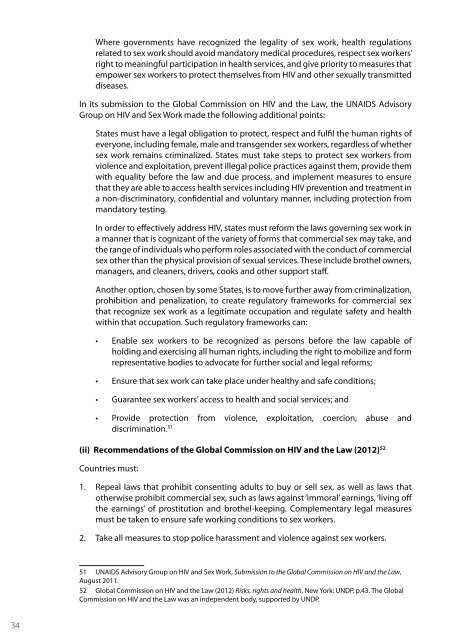SEX WORK AND THE LAW - HIV/AIDS Data Hub
SEX WORK AND THE LAW - HIV/AIDS Data Hub
SEX WORK AND THE LAW - HIV/AIDS Data Hub
You also want an ePaper? Increase the reach of your titles
YUMPU automatically turns print PDFs into web optimized ePapers that Google loves.
Where governments have recognized the legality of sex work, health regulations<br />
related to sex work should avoid mandatory medical procedures, respect sex workers’<br />
right to meaningful participation in health services, and give priority to measures that<br />
empower sex workers to protect themselves from <strong>HIV</strong> and other sexually transmitted<br />
diseases.<br />
In its submission to the Global Commission on <strong>HIV</strong> and the Law, the UN<strong>AIDS</strong> Advisory<br />
Group on <strong>HIV</strong> and Sex Work made the following additional points:<br />
States must have a legal obligation to protect, respect and fulfil the human rights of<br />
everyone, including female, male and transgender sex workers, regardless of whether<br />
sex work remains criminalized. States must take steps to protect sex workers from<br />
violence and exploitation, prevent illegal police practices against them, provide them<br />
with equality before the law and due process, and implement measures to ensure<br />
that they are able to access health services including <strong>HIV</strong> prevention and treatment in<br />
a non-discriminatory, confidential and voluntary manner, including protection from<br />
mandatory testing.<br />
In order to effectively address <strong>HIV</strong>, states must reform the laws governing sex work in<br />
a manner that is cognizant of the variety of forms that commercial sex may take, and<br />
the range of individuals who perform roles associated with the conduct of commercial<br />
sex other than the physical provision of sexual services. These include brothel owners,<br />
managers, and cleaners, drivers, cooks and other support staff.<br />
Another option, chosen by some States, is to move further away from criminalization,<br />
prohibition and penalization, to create regulatory frameworks for commercial sex<br />
that recognize sex work as a legitimate occupation and regulate safety and health<br />
within that occupation. Such regulatory frameworks can:<br />
<br />
<br />
<br />
Enable sex workers to be recognized as persons before the law capable of<br />
holding and exercising all human rights, including the right to mobilize and form<br />
representative bodies to advocate for further social and legal reforms;<br />
Ensure that sex work can take place under healthy and safe conditions;<br />
Guarantee sex workers’ access to health and social services; and<br />
Provide protection from violence, exploitation, coercion, abuse and<br />
discrimination. 51<br />
(ii) Recommendations of the Global Commission on <strong>HIV</strong> and the Law (2012) 52<br />
Countries must:<br />
1. Repeal laws that prohibit consenting adults to buy or sell sex, as well as laws that<br />
otherwise prohibit commercial sex, such as laws against ‘immoral’ earnings, ‘living off<br />
the earnings’ of prostitution and brothel-keeping. Complementary legal measures<br />
must be taken to ensure safe working conditions to sex workers.<br />
2. Take all measures to stop police harassment and violence against sex workers.<br />
51 UN<strong>AIDS</strong> Advisory Group on <strong>HIV</strong> and Sex Work, Submission to the Global Commission on <strong>HIV</strong> and the Law,<br />
August 2011.<br />
52 Global Commission on <strong>HIV</strong> and the Law (2012) Risks, rights and health, New York: UNDP, p.43. The Global<br />
Commission on <strong>HIV</strong> and the Law was an independent body, supported by UNDP.<br />
34
















